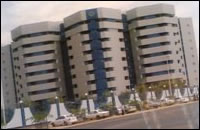Sudanese Banks Must Pull up their Socks!

 |
| Bank of Sudan |
However, I have noticed that the banking situation in Sudan in general and in Khartoum in particular has improved quite significantly, thanks to the advent of computer technology and the use of ATM (Automated Teller Machine). The use of computer has cut down paperwork and reduced banking as a whole-day and painstaking commitment to a mere 20 minutes to one hour affair, depending on what exactly you are after in the bank.
In majority of banks in Khartoum you can easily cash a cheque from your current account by going directly to the cashier’s window, and sign at the back of the cheque after showing an ID (mostly passport or national ID card). No long forms to fill. You can also be issued with a counter cheque if you turned up at your branch without your cheque book.
If you have an ATM card, you can drive to the nearest ATM and draw from your account. However, be warned: there are always two chances out of five that the ATM is out of service. This may be caused by unreliability of the network connection. In rare occasions, the ATM unit may be out of cash. I found ATMs installed by the Bank of Khartoum to be very reliable. That is, it works 99% of the time and gives out cash, as long as there is a positive balance in your account.
That said, there is still big room for improvement. First, customers must be taught to respect the principle of "first come first served." Until this day in Sudan in general, it seems that we operate a system of "last come, first served" because some last-comers often wade their way through the crowd and get what they want quicker than those who have been standing patiently before them.
Second, finding correct information to direct you through the bank can be problematic. Those sitting on the "help/information desk", from my experience, are either not good listeners or are ignorant about the bank's operating procedures. In December 2007 I wanted to draw money from my account using ATM at another branch of the same bank I hold account with. But their ATM was inoperative. I went into the branch and enquired whether it is possible to cash money directly from the cashier using my ID and ATM card. After spending nearly one hour being sent around from one office to another, I was issued with a counter cheque, which I could not cash after all because that bank was not the branch that I have account with. Hence, I wasted nearly an hour since nobody in the building bothered to ask me whether or not I hold a bank account with them or another branch. Nor did anyone warn me that that counter cheques are issued to banks customers that have opened an account with the branch concerned. In Sudan, you simply learn from your mistakes because nobody tells you what you ought to know!
Third, for some banks, reserving customer dignity is not a priority. This is because many bank employees are not polite but rude. You come out with an impression that you are not there to bring them business but to ask them for a favour. It does not matter whether you are drawing from your account, cashing a remittance, or transferring money. All the same, many bank officials in Khartoum will deliberately discriminate one customer and favour another in open daylight (It is not necessarily on the base of race). Not a smile or a word of thanks is expected of them. In fact, many would qualify better as maximum-security prison guards than bank’s officials. This significant category of bank officials can radiate an air of tyranny and rudeness beyond any description when serving their customers.
The missing link in all this is training and good management. Like in any good business, bank employees need to be trained on how to deliver services that will leave customers with a positive experience from the time they step into the door and the time they leave.
Anyone of us can afford to be polite. Anyone can learn to be a good listener and a good communicator. Banks employees need these essential skills badly. Moreover, it is the role of management to see to it that their customers are happy with the type of service they receive and identify areas for staff training.
Managers are also responsible for setting up effective business processes that do not confuse and waste customer time. They can do it by informing themselves through such means as customer’s feedback questionnaires, and "customer suggestion post boxes". This is because one can only improve that which one can measure. They can also use business consultants to evaluate their current business processes and advise managers on the area for change.
Now, what better feedback to our bank managers than that of a citizen writing a critique about the quality of service being provided by their banks?
